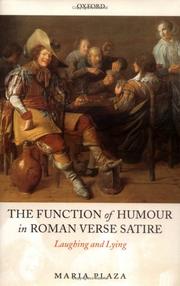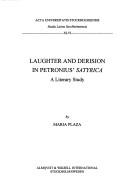| Listing 1 - 4 of 4 |
Sort by
|

ISBN: 9780199281114 0199281114 0191712736 019923793X 9786610755981 0191535842 1280755989 1429422009 Year: 2006 Publisher: Oxford Oxford university press
Abstract | Keywords | Export | Availability | Bookmark
 Loading...
Loading...Choose an application
- Reference Manager
- EndNote
- RefWorks (Direct export to RefWorks)
Maria Plaza sets out to analyze the function of humor in the Roman satirists Horace, Persius, and Juvenal. Her starting point is that satire is driven by two motives, which are to a certain extent opposed: to display humor, and to promote a serious moral message. She argues that, while the Roman satirist needs humor for his work's aesthetic merit, his proposed message suffers from the ambivalence that humor brings with it. Her analysis shows that this paradox is not only socio-ideological but also aesthetic, forming the ground for the curious, hybrid nature of Roman satire.
Comic, The, in literature. --- Humorous poetry, Latin --- Latin wit and humor --- Verse satire, Latin --- History and criticism. --- Comic, The, in literature --- Latin literature --- Latin humorous poetry --- Latin poetry --- History and criticism
Book
ISBN: 9780199216963 9780199216970 Year: 2009 Volume: *11 Publisher: Oxford Oxford university press
Abstract | Keywords | Export | Availability | Bookmark
 Loading...
Loading...Choose an application
- Reference Manager
- EndNote
- RefWorks (Direct export to RefWorks)
Latin poetry --- History and criticism --- Juvenal --- Persius --- Persjusz Flakkus, Aulus --- Perse --- Persius Flaccus, Aulus --- Flaccus, Aulus Persius --- Persius, Paulus Flaccus --- Persio --- Aulus Persius Flaccus Volateris --- Giovenale, D. Giunio --- Juvenalis, Decimus Junius --- Juvénal --- Criticism and interpretation. --- Iuvenalis, Decimus Iunius --- Iuvenalis, Decimus Junius --- Giovenale --- Iouvenalēs --- I︠U︡venal, D. I︠U︡nīĭ --- Yuvenalis --- Giovenale, Decimo Giunio

ISBN: 9122018913 9789122018919 Year: 2000 Volume: 46 Publisher: Stockholm : Almqvist & Wiksell,
Abstract | Keywords | Export | Availability | Bookmark
 Loading...
Loading...Choose an application
- Reference Manager
- EndNote
- RefWorks (Direct export to RefWorks)
Satire, Latin --- Laughter in literature. --- History and criticism. --- Petronius Arbiter. --- Rome --- In literature. --- Laughter in literature --- History and criticism --- Maderna, Bruno. --- Satire, Latin - History and criticism.
Book
ISBN: 019157077X 0199216967 0199216975 Year: 2009 Publisher: Oxford Oxford University Press, Incorporated
Abstract | Keywords | Export | Availability | Bookmark
 Loading...
Loading...Choose an application
- Reference Manager
- EndNote
- RefWorks (Direct export to RefWorks)
| Listing 1 - 4 of 4 |
Sort by
|

 Search
Search Feedback
Feedback About UniCat
About UniCat  Help
Help News
News